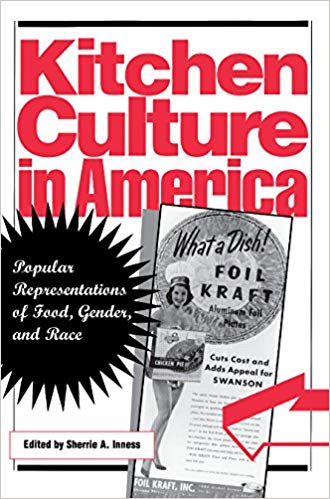edited by Sherrie A. Inness
From the publisher: At supermarkets across the nation, customers waiting in line—mostly female—flip through magazines displayed at the checkout stand. What we find on those magazine racks are countless images of food and, in particular, women: moms preparing lunch for the team, college roommates baking together, working women whipping up a meal in under an hour, dieters happy to find a lowfat ice cream that tastes great. In everything from billboards and product packaging to cooking shows, movies, and even sex guides, food has a presence that conveys powerful gender-coded messages that shape our society.
Kitchen Culture in America is a collection of essays that examine how women’s roles have been shaped by the principles and practice of consuming and preparing food. Exploring popular representations of food and gender in American society from 1895 to 1970, these essays argue that kitchen culture accomplishes more than just passing down cooking skills and well-loved recipes from generation to generation. Kitchen culture instructs women about how to behave like “correctly” gendered beings. One chapter reveals how juvenile cookbooks, a popular genre for over a century, have taught boys and girls not only the basics of cooking, but also the fine distinctions between their expected roles as grown men and women.
Several essays illuminate the ways in which food manufacturers have used gender imagery to define women first and foremost as consumers. Other essays, informed by current debates in the field of material culture, investigate how certain commodities like candy, which in the early twentieth century was advertised primarily as a feminine pleasure, have been culturally constructed. The book also takes a look at the complex relationships among food, gender, class, and race or ethnicity-as represented, for example, in the popular Southern black Mammy figure. In all of the essays, Kitchen Culture in America seeks to show how food serves as a marker of identity in American society.
Sherrie A. Inness is Distinguished Laura C. Harris Chair of Women’s Studies at Denison University. She is the author of Tough Girls: Women Warriors and Wonder Women in Popular Culture, also published by the University of Pennsylvania Press; The Lesbian Menace: Ideology, Identity, and the Representation of Lesbian Life; and Intimate Communities: Representation and Social Transformation in Women’s College Fiction, 1895-1910.
University of Pennsylvania Press, 2000

